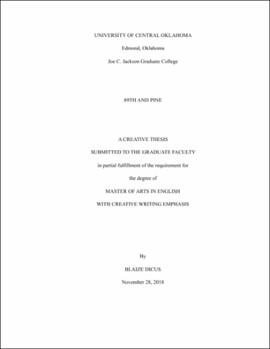| dc.description.abstract | 89th and Pine is a creative project that challenges the conventions of genre. While this work is labeled as a collection of poetry, the ultimate goal of the project is to subvert the norms of the genre, appropriately honor the grand tradition of poetry, and to enter into discourse with the current themes of 21st century poets. The work is a direct communication between the forms of prose and poetry. The pieces very deliberately shift from prose to poetry with every other entry in the collection, all while maintaining a unilateral narrative from beginning to end. The structure of the collection follows the traditional three-act format of a novel, mimicking the escalation of plot and the addition of characters, but also retains the thematic divides found in poetry collections with multiple sections. Poetry today is well-saturated with poets embarking on various forms of mixed genre experimentation. The forms found in Iteration Nets by Karla Kelsey is directly referenced in the closing three-piece unit of 89th and Pine. The Most of It by Mary Ruefle assisted in the argument of what is prose and what is poetry, which is found here in such pieces as "The Barista," "Family Circus," and "Gallon Jugs of Water." However, this creative project found much inspiration from Allen Ginsberg and Walt Whitman, as well, favoring the usage of many long lines. Citizen by Claudia Rankine is another collection that features mixed genre material; her pairing of verse and prose with numerous photographs and artistic visual cues, assails the reader into pondering what exactly is poetry or prose. Cultural icon and prolific rapper Post Malone said, "What I'm not into is boxes. I don't put people in boxes. There are no genres anymore." He is, of course, speaking of the music industry, but a similar trend is arising in the written word, too. Writers such as Rupi Kaur and r.h. sin are forsaking traditional form altogether and have created works aimed to just make readers feel something. The objective of 89th and Pine is to further progress the argument of whether genre distinction is at all necessary, or if today's readers just want to feel connected to what they're reading. Here lies the great challenge of this work: removing genre stigma. Readers are often resistant to poetry because it is seen as hard to grasp, and often are more drawn to the familiar world of fantastical fiction. 89th and Pine seeks to entertain the reader with a novelistic experience, but provide enough poetic dynamic to challenge the reader to seek further meaning from each piece. The key to the success of the project was to develop a convincing narrator to become the vehicle for the work. Without Oscar's sight, or lack thereof, the project would fall flat. While each poem, and each section of prose, is meant to stand alone, when compiled together they create a fluid narrative from beginning to end. It was necessary to divide the poetic elements into thematic sections, but also group them separately by form themselves; several shorter, prose-like poems are grouped together early on, and the later sections contain many image-driven organic poems. The evolution of the narrative coincides with the destruction of genre-lines, while maintaining a strong sense of story and plot. 89th and Pine, while not revolutionary in its mixed-genre conception, does present a fresh challenge to the current market of poetry collections. By the end of a reading, the debate should still exist whether this is a collection of short prose scenes enjambed with poetic pauses, or whether this is a poetry collection framed by a deliberate narrative arc. With this project, the hope is to imply that today's reader does not care whether this book is found in the poetry section or in the fiction section of the local bookstore. Genre is not just changing, it is vanishing. | |
